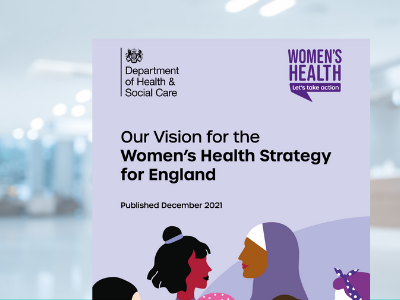The Department of Health and Social Care has published a new ‘vision’ for women’s health in England.
Released in December 2021, the document – entitled ‘Our Vision for the Women’s Health Strategy for England’ – follows on from the ‘Call for Evidence‘ on women’s health that was made by the Secretary of State for Health and Social Care and the Minister of State for Patient Safety, Suicide Prevention and Mental Health, last March.
By the time the request closed, 14 weeks later, there had been nearly 100,000 responses, as well as written input from experts and organisations within health and care.
The new vision is underpinned by these responses, with a more detailed strategy set to be published in spring 2022, to align with and expand on its proposals.
In the recent release, the vision sets out ambitions to improve women’s health, and focuses on themes such as women’s voices, healthcare policies and services, workplace health, information and education, and research, evidence and data.
There are also dedicated sections on: menstrual health and gynaecological conditions; fertility, pregnancy, pregnancy loss, and post-natal support; the menopause; healthy ageing and long-term conditions; mental health; and the health impacts of violence against women and girls.
In the foreword, attributed to The Rt Hon Sajid Javid MP and Maria Caulfield MP, it’s stated: ‘It is time to re-set the dial on women’s health. This publication sets the government’s vision for a new healthcare system, which offers equal access to effective care and support, prioritising care on the basis of clinical need and not of gender.’
Each section within the vision lays out both ambitions and next steps, with a selection of the aims mentioned including that:
- Women feel comfortable talking about their health, whether that be with healthcare professionals, friends or family; women know when they can seek help for symptoms; and women’s health issues are no longer taboo topics.
- Women feel better listened to and heard by healthcare professionals, and women’s concerns and symptoms are taken seriously.
- Women’s voices and experiences are represented and listened to at all levels and in all areas of the healthcare system.
- Women can access services that meet their reproductive health needs across the life course, and women’s experiences of services and reproductive health outcomes are improved.
- National healthcare policy and services consider women’s needs specifically, and by default.
- All women, including those with additional risk factors or who face additional barriers in accessing services, have equitable access to and experience of services, and disparities in outcomes are reduced.
- Women’s voices and priorities are at the heart of research, from identification of need through to participation in research, dissemination of research findings, and implementation in practice.
- Women and girls who are victims of violence and abuse are supported by the healthcare system and in the workplace, and the healthcare system takes an increased role in prevention, early identification and provision of support for victims.
Read the vision in full, here.



